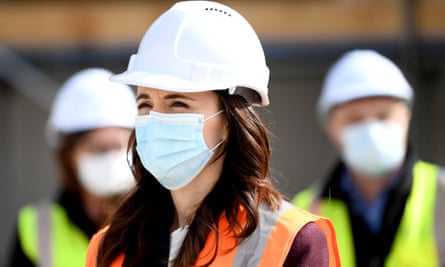As New Zealand’s average house price closes in on $1m, a generation says they’re being locked out of the market – and the glacial impact of government reforms may come too late, if it arrives at all.
“It’s urgent,” says Isla Stewart, 20, a housing advocate living in Auckland, New Zealand’s most expensive city. “The government’s failure to quickly address the housing crisis could result in a generation being frozen out of the housing market. Disconnected from their communities, living in unhealthy, unstable housing situations.”
Six months on from a slate of government reform announcements that aimed to cool the market, New Zealand’s runaway house prices show zero signs of slowing. The average national house price has hit NZ$937,000 – a record high, according to property analytics data company, CoreLogic, while Real Estate Institute data shows there was a 31% increase over the year to July.
Experts say it’s still too soon to definitively say whether the government’s housing reforms have failed. But even if the reforms managed to halt house-price growth in its tracks in a few years, that will be too late for a generation of younger New Zealanders, who are looking down the barrel of a 50% rise in prices in the coming years, building on already-stratospheric highs.
Stewart says there’s a lack of urgency from government. “The problems of the housing crisis can sometimes be theoretical to the people in power,” she says – they are people who typically own their own homes. “I think that makes taking action more difficult for them.”

“We’re already feeling the negative impacts, on our housing quality, on security of housing – of course that effects, you know, all facets of our health,” she says.
“The story of inequality in Aotearoa is the story of the housing crisis – and how that plays out in both homeownership but also in the inequities playing out in renting,” says Auckland Central MP Chlöe Swarbrick.
Fundamentally, the government did not want to see prices fall and its policies reflect this, she said. But if prices do not fall, and rents are not controlled, both young and old will remain locked out of the market. Prime minister Jacinda Ardern has repeatedly said that she wants to see house prices “stabilise” but not that they should drop. If that remains the government’s approach, it would mean price increases over the coming years are likely to remain baked in.
“When we are talking about generations being locked out of the housing market … when have set up our entire economy on the premise that everyone is going to have that asset in old age … and that is not something that is achievable for a number of people, then, you have systematic inequality,” Swarbrick says.
Forty years of policy neglect
CoreLogic’s biannual housing affordability report shows the average property value has risen to nearly eight times the annual household income – which is well above the long-term average of 5.8 times, and putting it at its worst level in 18 years.
And while property values rose 15% in the first six months of the year, the gross average household income lifted a paltry 1%.
“You’re probably better to call it the unaffordability report,” CoreLogic’s chief property economist, Kelvin Davidson said, adding that the average length of time for a first homebuyer to save for a house is now 10.5 years – three years longer than the long-term average.
Meanwhile, those who are lucky enough to own a home are spending more than a third of their income on mortgage repayments. While that is considered average by the OECD, current mortgage rates are low and the real strain will hit when those change, Davidson said.
“When mortgage rates go higher over the next year or two, that number is going to go above average.”
The situation is going to get worse before it gets better, and getting back to some kind of normality will take a number of years, he said.
The government’s March policy announcements are the latest in a continuum of measures designed to fix the crisis, but some are yet to bear fruit, including an overhaul of the land-use and environment legislation, the Resource Management ACT (RMA), which has not yet had its first reading in parliament.
The number of new builds being approved are improving – up 20% in the year to July. But global supply delays and domestic labour shortages are placing limits on what can be achieved, economist Shamubeel Eaqub said.
The government is pulling a lot of levers, but it has not pulled them hard enough, or fast enough, he said.
“It’s all heading in the right direction: reforms to the RMA, reforms to financing, reform of rental policies, lending policies, but they are not biting yet. The evidence is in the house prices, they are still booming.”
The government is trying to deal with 40 years of policy neglect, and it is difficult to catch up quickly, he said.
These pressures are felt the most by those who are both locked out of the market, and cannot afford rent. The number of households waiting for social housing has hit 23,000 and there are more than 4,000 children living in motels, but the government’s commitment to creating 18,000 new social houses by 2024 is not enough to meet demand.
Last year, the United Nations’ special rapporteur on the right to adequate housing, Leilani Farha, visited New Zealand and called the housing situation “a human rights crisis” and “a dark shadow that hangs over the country”. In August, the country’s own Human Rights Commission said it was launching a national inquiry into the problem.
Renters United spokesperson Robert Whitaker said with more people than ever renting, the government must introduce a cap on rent prices and ensure their rights are being protected.
“The reality is that any other interventions they make for renters are blunted by the fact that rent will continue to go up.”
